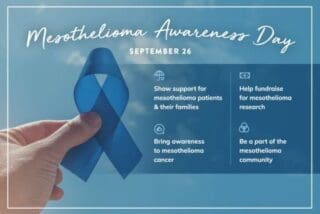Every day, it seems there are more stories in the news about asbestos exposure in various communities across the globe. It’s a lurking threat that won’t simply go away. Even though at least 58 countries have now banned the toxin, it’s still being used in about 70% of the world, including the United States.
Exposure to the toxin can cause a number of diseases, including mesothelioma. Though it’s rare, an estimated 20 million are at risk of developing this cancer at some point in their lives. Its only known cause is exposure to asbestos, and it’s entirely preventable.
Global Asbestos Awareness Week is April 1—April 7. It’s a time to work together and raise awareness on the dangers of this toxin and the preventable diseases it can cause. It’s also a great opportunity to advocate for a global ban.
Steps Toward an Asbestos Ban
Last year, advocates felt hope with new laws being introduced. The number of nations banning the toxin is slowly growing. Last June, New Zealand announced their plans to ban the importation of asbestos-containing products. As of October, the new regulations took effect and they became the 58th country to ban the toxin.
Canada also announced its plans for a full ban on asbestos last year. In December, Science Minister Kirsty Duncan announced there would be a full ban by 2018. Their new rules, mostly implemented by the Canadian Environmental Protection Act (CEPA), includes updates to worker safety and building codes. Now any new building will disallow the use of asbestos-containing materials, and the importation of such products will also be discontinued.
The United States seemed to also be making progress toward a future ban on the toxin. Last year, former President Barack Obama signed the Frank R. Lautenberg Act which gave the Environmental Protection Agency (EPA) the ability to evaluate chemicals with safety in mind. When they released their list of ten chemicals they would investigate first, anti-asbestos advocates were thrilled to see asbestos included.
Though the investigation process could take years to complete and there was no explicit guarantee of a ban, the EPA could certainly take that next step. The future seems a little less clear now under the Trump administration, but there is still hope for an asbestos-free future.
Improving Cancer Prevention
Though asbestos is a known carcinogen, it still is often forgotten. Its invisible fibers lingering in old homes and buildings are a hidden danger that so many people simply aren’t aware of. The first step to finally reaching a ban is better awareness.
Educating loved ones on what asbestos is and some common places it can be found could prevent them from facing mesothelioma one day. No amount of exposure to asbestos is considered safe. Until asbestos is finally banned, more lives are being put at risk.
Asbestos becomes a health risk when it’s damaged, allowing the fibers to be inhaled or ingested. Over time, the fibers may cause inflammation, scarring and, eventually, tumors. Secondhand exposure is also a serious threat. Workers in certain professions, like automotive repairs or construction, are more likely to work with asbestos and face exposure. The fibers can potentially attach to their clothing and put others at risk.
Mesothelioma is a deadly disease with a poor prognosis. Typically patients are given 12-21 months to live, though there are some survivors who have lived beyond these odds. It’s a difficult disease to treat, so early detection is essential if it’s too late for prevention.
Mesothelioma is just one example of a deadly disease caused by asbestos. Exposure can also cause asbestosis, lung cancer, and other dangerous diseases. Recognizing the dangers of asbestos and educating our loved ones can save lives. Helping to raise awareness in your own communities could also help make a ban a reality.
Supporting Change
Asbestos-related diseases are completely preventable. More countries are taking the steps necessary to ban asbestos and help eliminate these diseases for good.
Global Asbestos Awareness Week is a time to celebrate the steps these nations have taken to eliminate the toxin, but also to help enact further change. Join us on Facebook and Twitter throughout the week to show your support using #2017GAAW.
You can also learn more about different advocacy efforts in the community through organizations like the Asbestos Disease Awareness Organization. Their organization is dedicated to eliminating asbestos-related diseases and advocating for a ban on the toxin.
It’s up to all of us to raise awareness. Together, we can better prevent these diseases and bring the world closer to a ban on asbestos.





